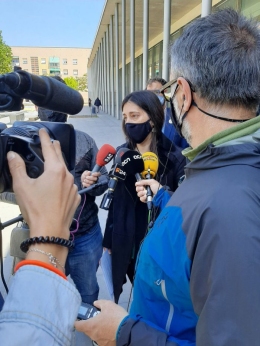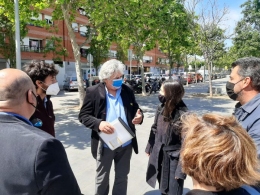On Thursday 6 May, Flemish citizen Kris Charlier testified for two hours at El Prat del Llobregat magistrates' court. The case pertains to a complaint he filed in 2019, accusing two Civil Guard officers at Barcelona El Prat Airport of humiliating and discriminating against him for speaking Catalan, despite the law allowing him to do so. The police officers detained Charlier in the airport security area when they noticed he was wearing something under his clothes. Then, when they couldn't understand the explanations offered by the man, who speaks Catalan but not Spanish, they made him lower his trousers in public to show the stoma bag he has had to use since undergoing an operation for colon cancer.
The civil guards also charged him with disrupting public order and refusing to cooperate with the police. For his part, and with legal support from Plataforma per la Llengua, Charlier filed a complaint against the two officers for committing a crime against moral integrity, which can carry a sentence of between six months and two years in prison. The complaint was accepted for processing, and the media quickly caught on to the story, with Charlier being interviewed by several newspapers and radio and television programmes.
Now, almost eighteen months after the incident, Charlier has been called to testify and describe his version of the events that day. The fact that the judge has not decided to throw out the case is remarkable considering that only one other episode of linguistic discrimination has ever been investigated in criminal proceedings in Catalonia, despite recurrent cases of language discrimination against Catalan speakers. That case was brought by a farmer from the Empordà region, who also accused the Civil Guard of harassment, but the police officers were eventually acquitted.
In Charlier's case, the fact that there are images of the events that took place on that day at Barcelona airport could make all the difference. Now that he has testified, the judge will have to determine whether she finds any evidence of criminality in the officers' behaviour and, if she does, the officers will be summoned to testify and be formally charged.
Neus Mestres, the director of Plataforma per la Llengua, read a statement outside the El Prat del Llobregat court, in which she appealed to the authorities to take action against linguistic discrimination. Several politicians have also spoken out in support of Charlier: Dani Cornellà, CUP representative to the Catalan Parliament, Juli Fernández and Engelbert Montalà, ERC representatives to the Catalan Parliament, Aurora Madaula, Junts per Catalunya representative to the Catalan Parliament, Jess González, En Comú Podem representative to the Catalonian Parliament and Joan Josep Galiano Peralta, mayor of Bigues i Riells (Mr. Charlier's place of residence in Catalonia).
In its latest evaluation report on the implementation of the recommendations for immediate action contained in the fifth evaluation report on Spain (31 March 2021), the Council of Europe's Committee of Experts on the European Charter for Regional or Minority Languages stresses that even though Spanish legislation declares the importance and the use of co-official languages in the public sector, this provision has not been put into practice in a way that would ensure an increase in the level of proficiency in regional or minority languages in that sector", a discrimination that has been criticised for many years by Plataforma per la Llengua.
Plataforma per la Llengua is the biggest language rights organisation in Europe. Supported by more than 23,500 members, since 1993 our association has been campaigning for the protection and promotion of the Catalan language throughout the linguistic domain: Andorra, Spain, France and Italy.
Humiliated, discriminated and reported
The incident happened on Monday the 9th of December 2019, when the individual concerned, a Belgian citizen and resident of Catalonia, was about to walk through the security scanner at El Prat Airport. The guard noticed that Charlier was wearing something under his clothes and requested he show it to him. The passenger explained to him, in Catalan, that it was a stoma bag, fitted due to an operation for colon cancer, and that he didn't even show it to his relatives because it wasn't pleasant to see. The guard responded by mocking the bag that collects his excrement: "stoma, stoma, what's a stoma?". Furthermore, he insisted Charlier spoke in Spanish. Charlier explained that he was born in Belgium and could speak Dutch, English, French and German, as well as Catalan, but he couldn't speak Spanish and found it difficult to understand.
At that point, the security guard called over two Civil Guard officers who were close to the security area. The officers told the passenger in no uncertain terms that they didn't understand Catalan and insisted he change his language even though the Spanish Police have a duty to ensure that any citizen can address them in Catalan. He responded by explaining that he lived in Bigues i Riells and didn't speak Spanish well because the town's residents generally communicate in Catalan. Thinking he was referring to a foreign town, the officials asked him where he was. When they learned that it was a municipality in Catalonia, they became outraged, saying, "this is Spain, and we speak Spanish here". In a clear breach of the law, at no point did the police officers offer him the possibility of speaking to someone in Catalan or with a person who could understand him. It should be noted that the Law on the Basic Status of Public Employees obliges civil servants to guarantee that "citizens are attended in the language they request so long as that language is an official language of the territory".
Although the complainant repeated that he preferred not to show the stoma in public because it was intimate and unpleasant, given the officers' insistence and his distress, which was further compounded by his limited understanding of Spanish, he eventually gave in and, as it was the only way he could show the stoma bag, had to pull down his trousers. At that point, even though he had done nothing but comply with their orders, the two agents manhandled him to a small room where, in the presence of four other police officers, they issued their first charge against him for disrupting public order.
The officers then demanded Charlier show them the bag of excrement while at the same time telling him not to pull down his trousers despite that being the only way they could inspect the bag, which was, theoretically, the reason they'd escorted him there in the first place. Eventually, in an absurd turn of events, the citizen ended up taking off his T-shirt.
After that, the agents began to search his luggage and asked him again where he lived. He told them he lived in Bigues i Riells and, noticing they had written "Riels del Fai", a village located in the municipality of Bigues i Riells, advised them of their mistake. His precision, however, further aggravated the officers, who issued a second charge against him, this time for refusing to cooperate with the police. At no point during his interrogation in that room did the Civil Guard officers inform Charlier of his basic rights or the possibility of having a lawyer, nor did they bring in any officer who could communicate with him in one of the five languages he speaks.
Later, when Charlier was already seated on the plane, a security guard boarded the jet to inform him that the police had forbidden him to fly, and he was to exit the aircraft immediately. He was then unable to purchase another ticket because Ryanair told him the next flights were full. However, Charlier subsequently verified online that this was not the case. Eventually, realising he wouldn't be able to fly, he returned home having had two complaints filed against him by the Spanish police.
Almost seventy cases in twelve years
In recent years, Plataforma per la Llengua has logged numerous incidences of linguistic discrimination against Catalan-speaking citizens by the Civil Guard and the National Police. The entity's study of Linguistic behaviour in interactions with the Spanish police contains data on the 68 cases detected between 2007 and 2019.
The NGO for the Catalan language says all the incidences of discrimination involved harassment and 15% of them involved physical aggression towards citizens. Most of the incidences of discrimination had no legal consequences, and only in 3% of the cases did the police end up being convicted.
Every year, Plataforma per la Llengua catalogues hundreds of cases of linguistic discrimination through its complaints and queries service. This week it launched its DiscriminCats online test, which uses nine real-life cases of discrimination described in the 2019 Report on Linguistic Discriminations to highlight the discriminatory attitudes faced by citizens from all over the linguistic domain because of their language.






